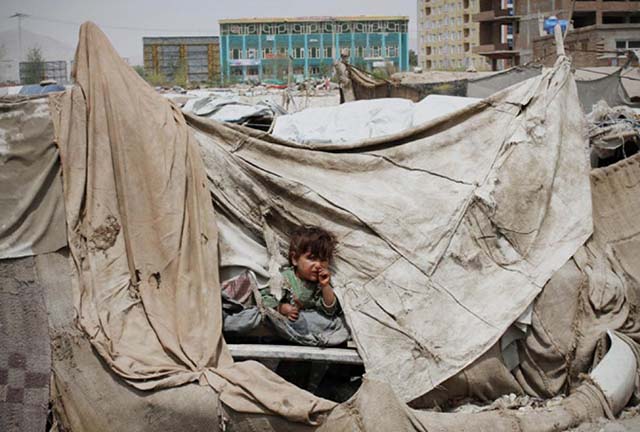With the war and insurgency in the country going on unabatedly, Afghanistan is facing a deteriorating humanitarian crisis. A large portion of the Afghan civilians suffer hardships and misery such as day-to-day violence, insecurity, poverty, displacements and lack basic living requirements. Afghanistan’s Independent Human Rights Commission (AIHRC) says that based on its assessment internal displacements in the country has increased while number of refugees voluntarily returning from Iran and Pakistan has drastically reduced. According to Sima Samar, the chairwoman of the commission, a staggering 1.2 million Afghans were displaced internally this year due to the ongoing conflict and deteriorating security situation across the country. Samar said the number of internally displaced people this year constituted more than four percent of the country’s population and was five times higher than in the year 2009. According to the head of the Afghanistan’s Independent Human Rights Commission (AIHRC), internally displaced Afghans live in camps lacking basic facilities such as drinking water, hygiene and sanitation. On the other hand, the AIHRC officials say hundreds of Afghan refugees are deported forcefully and without any prior notice from neighboring countries.
This year was a particular year in Afghanistan with the militant groups waging an unprecedented campaign of violence since the overthrow of the Taliban regime in 2001. There was a high rate of civilian casualties along with tolls from the armed forces fighting the Taliban and other insurgent groups. The Taliban managed to expand their insurgency across the country particularly into the northern and central parts of the country while intensifying their campaign of violence in eastern and southern parts of the country. In addition to the increased militancy in the country, there is now an amalgamation of militant groups operating across the country. The militancy in Afghanistan was compounded by emergence of many more dangerous and warring militant groups. All these led to further bloodshed and violence in the country. Afghan civilians’ share of the war tolls and victims is has been enormous. There is a staggering increase in civilian casualties. Despite that both government forces and the militant groups are responsible for the sharp rise of civilian tolls, a high percentage of the civilian suffering are attributed to the militant groups. The Taliban and other insurgents are accused of deliberately targeting civilians in the battlefields, villages and the insecure highways across the country. Despite the Taliban’s claimed policy of avoiding targeting innocent people in the conflict, militant fighters belonging to different groups have deliberately or randomly targeted civilians. The kidnapping of civilians on the highways found a gruesome dimension this year with ordinary passengers being kidnapped after being identified to belonging to specific minority groups.
Responsible for defending and protecting civilians, the Afghan government has largely fallen short of efficiently protecting the civilians and providing security for the civilian population. Despite the bravery and capabilities of Afghan National Security Forces (ANSF), there were many shortcomings on the government’s part in defending the country against the militants’ offensives. Political disagreements over power sharing issues left the ministry of defense without a minister for more than a year. On the other hand, while the militants managed to wage the war in many fronts and expand their insurgency to many more areas that previously were relatively secure, the government lacked effective war leadership and reacted based on occurrence of security incidents across the country.
This led to further expansion of the insurgency in different parts of the country, and to areas that were relatively secure before. As the AIHRC officials announced, a record number of Afghans were displaced both internally and to other countries this year. The deteriorating humanitarian situation in Afghanistan is particularly highlighted this year by a record number of Afghan youths leaving the country in search of security and better lives in European countries. There have been efforts by the government to curb the flow of people leaving the country by tacitly and openly calling on the destination nations to send the refuges back. Rather helping to resolve the worsening humanitarian situation in the country, such an approach has triggered bitter criticisms to the government and sent a shockwave among the refugees who have gambled their lives for reach Europe. The pressures were to the extent that the government officials were compelled to deny any government collusion with the European countries to send Afghan refugees back.
With the deteriorating security situation in the country, hundreds of thousands of Afghans are displaced to relatively more secure areas in the country, while many are forced to live in camps and temporary shelters. This is while many more are seeking to stay in neighboring countries despite the countries’ systematic mistreatment of the Afghan refugees. Initially, a considerable number of Afghans living in Iran and Pakistan were returning with the hope to see their lives changed and find employments in the country. However, due to the economic challenges and lack of employment for the working Afghans, the trend reversed, and now more people are trying to get out of the country compared to those wanting to return the country. In such a desperate situation, no short-term plans would ease the worsening humanitarian conditions in the country.
Afghanistan’s humanitarian problem cannot be resolved without addressing the root causes of the challenges affecting day-to-day lives of the citizens. The government needs to devise a comprehensive plan for protecting the people in the cities, towns and villages and helping them to get employment. Short-term measures aimed at appeasing specific groups of people would not work in resolving the challenges. The government needs to convince the public of its will, efficiency and capability in restoring security and creating jobs opportunities. It must demonstrate a great will for improving governance and fighting corruption at highest level. Regaining public confidence would help the government to address the economic and security challenges with more rigor and efficiency.

